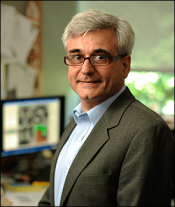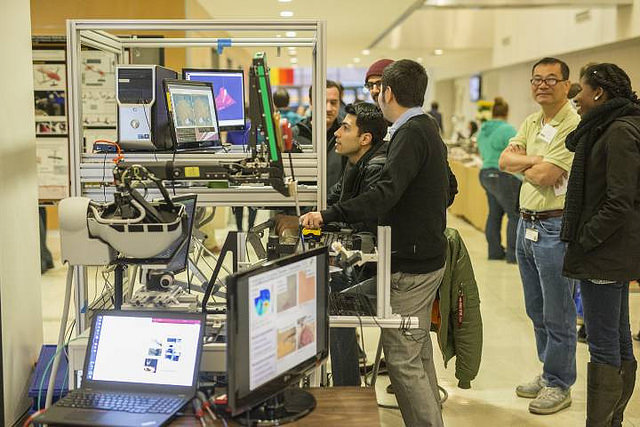Home » News » The Vanderbilt Institute in Surgery and Engineering (VISE): Bringing Engineers and Surgeons Together to Improve Patient Care
The Vanderbilt Institute in Surgery and Engineering (VISE): Bringing Engineers and Surgeons Together to Improve Patient Care
Posted by anderc8 on Tuesday, January 24, 2017 in News, TIPs 2015.

 Written by Dr. Benoit M. Dawant
Written by Dr. Benoit M. Dawant
Cornelius Vanderbilt Chair in Engineering
VISE Steering Committee Chair and Center Director
Watch a short video that features Dr. Dawant providing an overview of VISE
Innovation in processes, devices, and systems is at the center of recent advances that are transforming medical interventional procedures. The conception, development, realization, and evaluation of novel solutions that will further advance surgical and procedural patient care is complex and requires close trans-institutional interaction between clinicians, engineers, and scientists. This necessitates environments in which technical teams and practitioners can seamlessly and routinely interact, exchange ideas, and evaluate solutions. The Vanderbilt Institute in Surgery and Engineering (VISE) is an interdisciplinary, trans-institutional entity designed to facilitate these interactions and exchanges. Its mission is the creation, development, implementation, clinical evaluation and commercialization of methods, devices, algorithms, and systems designed to facilitate interventional processes and their outcome. Its goal is to become the premier center for the training of the next generation of surgeons, engineers, and computer scientists capable of working synergistically on new solutions to complex interventional problems, ultimately resulting in improved patient care. VISE includes ten technical laboratories spanning three engineering departments (Biomedical Engineering, Mechanical Engineering, and Electrical Engineering and Computer Science) and the Otolaryngology department as well as clinical departments that include Surgery, Neurological Surgery, Radiology, Otolaryngology, Hearing and Speech, Oncology, Gastroenterology, Surgical and Radiological Oncology, Ophthalmology, Urology, and Thoracic Surgery.

Graduate students Long Wang and Rashid Yasin from the A.R.M.A. Lab demonstrate their new robot during the VISE Fifth Annual Symposium & Poster Session with keynote speaker, Christopher P. Austin, MD, Director, National Center for Advancing Translational Science at the National Institutes of Health. Photo by Joe Howell
The VISE effort is supported by a diverse portfolio of federal grants, primarily from the NIH and the NSF, by contracts with industry, and by TIPs funds. Research conducted by VISE affiliates has a broad societal impact. Three among dozens of examples appear in the list of 10 fascinating inventions of 2014 featured by the Vanderbilt Center for Technology Transfer & Commercialization (https://www.youtube.com/watch?v=SZNPIobXmE ) and VISE affiliates work is regularly featured in popular media (http://channel.nationalgeographic.com/brain-surgery-live-with-mental-floss/videos/brain-surgery-robots/ and http://www.wsj.com/articles/six-new-medical-technologies-worth-watching-1466992921).
VISE affiliates are also involved in the commercialization of their technology through startups or collaboration/licensing agreements, broadening societal impact. Examples include companies that have been started in abdominal surgical guidance, neurosurgical image guidance, endoscopy, surgical robotics, and in deep brain stimulation. These companies have been supported with NIH SBIR and STTR funds, through NSF Innovation Corps awards, as well as via venture capital.
The TIPS award provides support for a seminar series and an annual symposium. It permits to expand the network of collaborations by seeding new trans-institutional projects, it solidifies collaborations among engineers and physicians through a new physician-in-residence program, it helps in recruiting the best postdoctoral and medical fellows, it invigorates graduate education through new interdisciplinary graduate certificates, and it creates engaging immersion experiences for undergraduate students.
For more information, please visit us at www.vanderbilt.edu/vise and follow us on our social media channels:
Facebook: https://www.facebook.com/visevanderbilt
Instagram: https://www.instagram.com/visevanderbilt/
Twitter: https://twitter.com/ViseVanderbilt
YouTube: http://vanderbi.lt/viseyoutube
